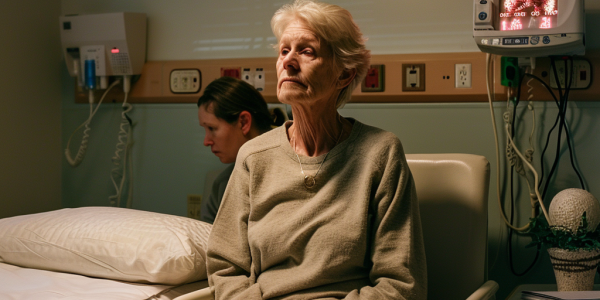Navigating Digital Privacy and COVID-19 Treatment Advances
In the digital age, managing privacy is crucial as users navigate cookie preferences on websites. Recent studies show that the COVID-19 treatment nirmatrelvir plus ritonavir significantly reduces hospitalization rates and long COVID symptoms. Understanding the implications of these findings is essential for high-risk populations and future healthcare strategies.
Mental Health Risks Surge After Heart Disease Hospitalization
Recent research reveals that individuals hospitalized for cardiovascular disease face an 83% increased risk of developing psychiatric disorders and suicide attempts within a year. This study emphasizes the importance of addressing mental health alongside physical recovery post-heart disease hospitalization, urging healthcare providers to monitor for anxiety, depression, and other mental health challenges. By prioritizing mental health care, we can improve recovery outcomes for patients.
Queensland Faces Health Crisis Amid Surge in Influenza Cases
Queensland is facing a health crisis with a surge in influenza cases, dubbed a ‘flunami,’ as flu hospitalizations surpass COVID-19 for the first time this year. Over 80% of those hospitalized are unvaccinated, highlighting the urgent need for public health measures and vaccination. Health officials stress the importance of community awareness and proactive health measures to combat this escalating flu season.
Delirium in Older COVID-19 Patients Linked to Decline in Functional and Cognitive Abilities
A recent study published in JAMA Network Open found that older COVID-19 patients who experience delirium during their hospital stay may face a decline in functional and cognitive abilities post-discharge. Factors exacerbated by the pandemic, such as extended hospital stays and social isolation, contributed to the increased risk of delirium. In-hospital delirium was associated with higher functional disability rates and worsened cognitive symptoms in the 6 months following discharge.
Study finds Paxlovid reduces hospitalization risk in pediatric COVID-19 patients
A University of Hong Kong study found that treatment with the antiviral drug Paxlovid is linked to a 34% lower risk of hospitalization in COVID-19 patients aged 12-17. The research showed that Paxlovid reduced hospitalization rates and was effective in non-hospitalized pediatric patients with the Omicron variant.
Impact of Hot Weather on Older Individuals with Multiple Chronic Diseases
A new study by Griffith University reveals that older individuals with multiple chronic diseases are at an increased risk of hospitalization during hot weather. Dr. Zhiwei Xu emphasizes the need to consider these individuals as a distinct heat-vulnerable group in future heat early warning systems. With global temperatures rising, hospitals are expected to see a surge in patients with multimorbidity. Comprehensive medical management is crucial for these patients, who require more extensive care compared to those with a single chronic disease.
Study Analyzes Trends and Outcomes of Hospitalized Patients with Priapism in Germany
A recent study analyzed nationwide inpatient data in Germany to evaluate in-hospital outcomes and trends in cases of high- and low-flow priapism. Priapism, an unwanted and prolonged erection, can be ischemic or non-ischemic. The study aimed to understand treatment measures for both types, utilizing data from 2008 to 2021. Statistical analyses were conducted to compare variables and evaluate the impact of sickle cell disease and selective artery embolization. The study highlights rising hospitalizations for ischemic priapism and provides insights for improving patient care.
New RSV Vaccine Registered in New Zealand Offers Hope to Older Adults
A groundbreaking new vaccine has been registered in New Zealand to protect older adults, particularly Māori, Pasifika, and those over 60, against Respiratory Syncytial Virus (RSV). Developed over 50 years, the Arexvy vaccine shows promising efficacy rates in clinical trials, offering hope in the fight against RSV-associated lower respiratory tract disease.
Shifting Patterns of RSV Infections Among Older Children
Recent data from a cohort study highlights shifting patterns of RSV infections among older children, signaling a need for updated prevention strategies. The study spanning from 2015 to 2022 reveals changes in seasonal occurrence post-COVID-19, with RSV cases remaining high among children under 5. Published in JAMA Network Open, the findings emphasize the importance of tailored interventions for older children to address the evolving landscape of RSV infections.
Study Reveals Higher Mortality Risk for Black Women with Antibiotic-Resistant Blood Infections
New research presented at the ESCIMD Global Congress in Barcelona revealed concerning findings regarding the outcomes of Black women hospitalized in the US with a blood infection resistant to last-resort antibiotics. The study, led by Dr. Felicia Ruffin from Duke University School of Medicine, highlighted that Black women facing bloodstream infections caused by carbapenem-resistant enterobacterales (CRE) were at a significantly higher risk of death compared to Black men or White women. The study emphasized the need for further research to uncover the social determinants influencing health outcomes in these cases and address disparities in healthcare.










